Public Health Interview Report: Interview with Dr. Ramon Shaban
VerifiedAdded on 2023/01/23
|15
|3932
|24
Report
AI Summary
This report presents an interview with Dr. Ramon Shaban, a clinician, educator, and researcher. The interview covers his research interests, including infectious diseases, infection prevention and control, clinical judgment, and health system performance. Dr. Shaban discusses his role as the editor of the journal 'Australasian Emergency Care,' the journal's scope, and its international standing. The report also includes details on his family background, career trajectory, and current positions, such as his professorship at the University of Sydney and Western Sydney Local Health District. Additionally, it highlights his involvement in various organizations, including the Australian Government Strategic and Technical Advisory Group on antimicrobial resistance and the World Health Organization's network on global outbreaks. The methodology section outlines the preparation, interview process, and data analysis. The report also provides the interviewer's biographical details, current role, and career aspirations, offering insights into the interviewer's professional journey and future goals, along with advice for other nurses regarding infection control practices.
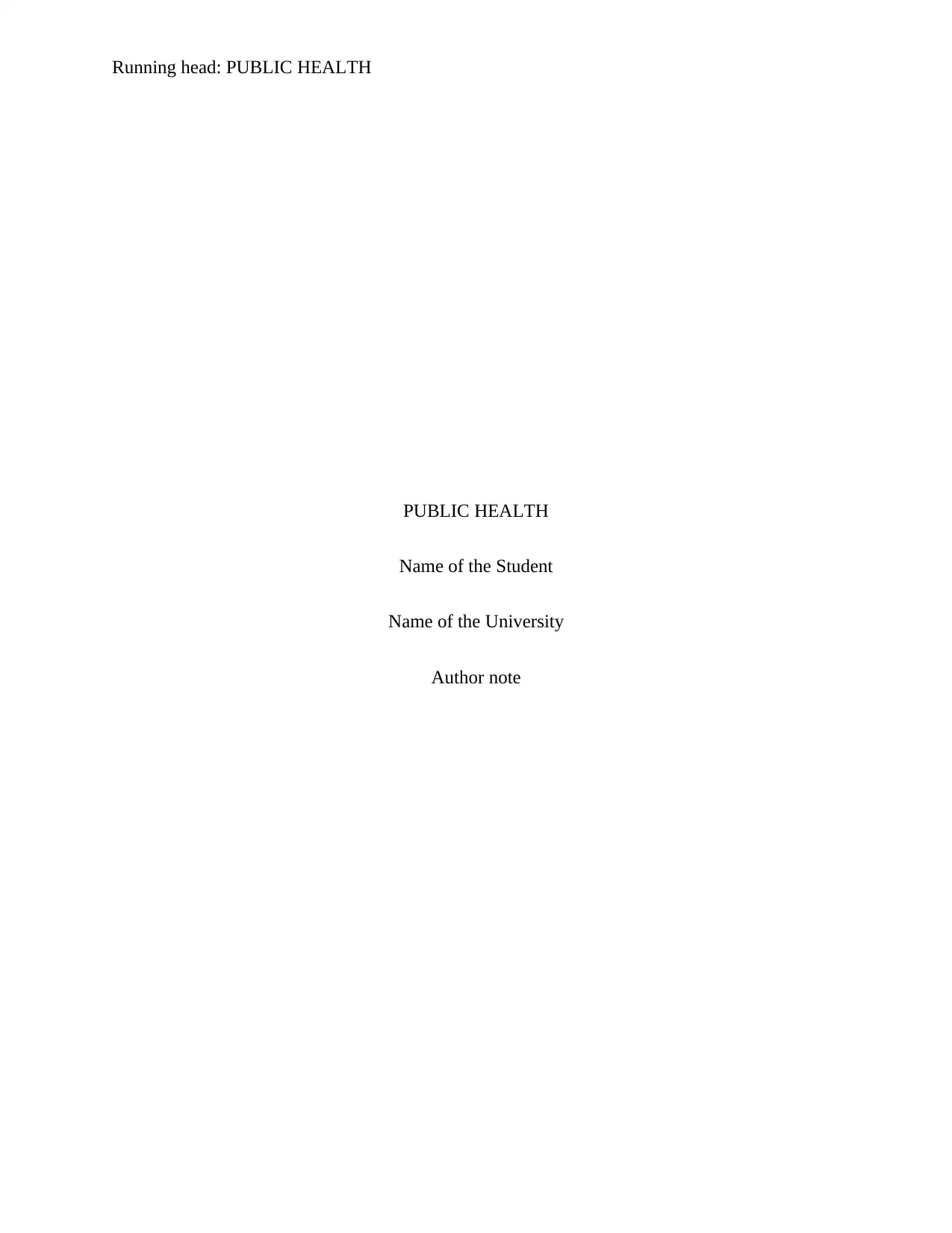
Running head: PUBLIC HEALTH
PUBLIC HEALTH
Name of the Student
Name of the University
Author note
PUBLIC HEALTH
Name of the Student
Name of the University
Author note
Paraphrase This Document
Need a fresh take? Get an instant paraphrase of this document with our AI Paraphraser
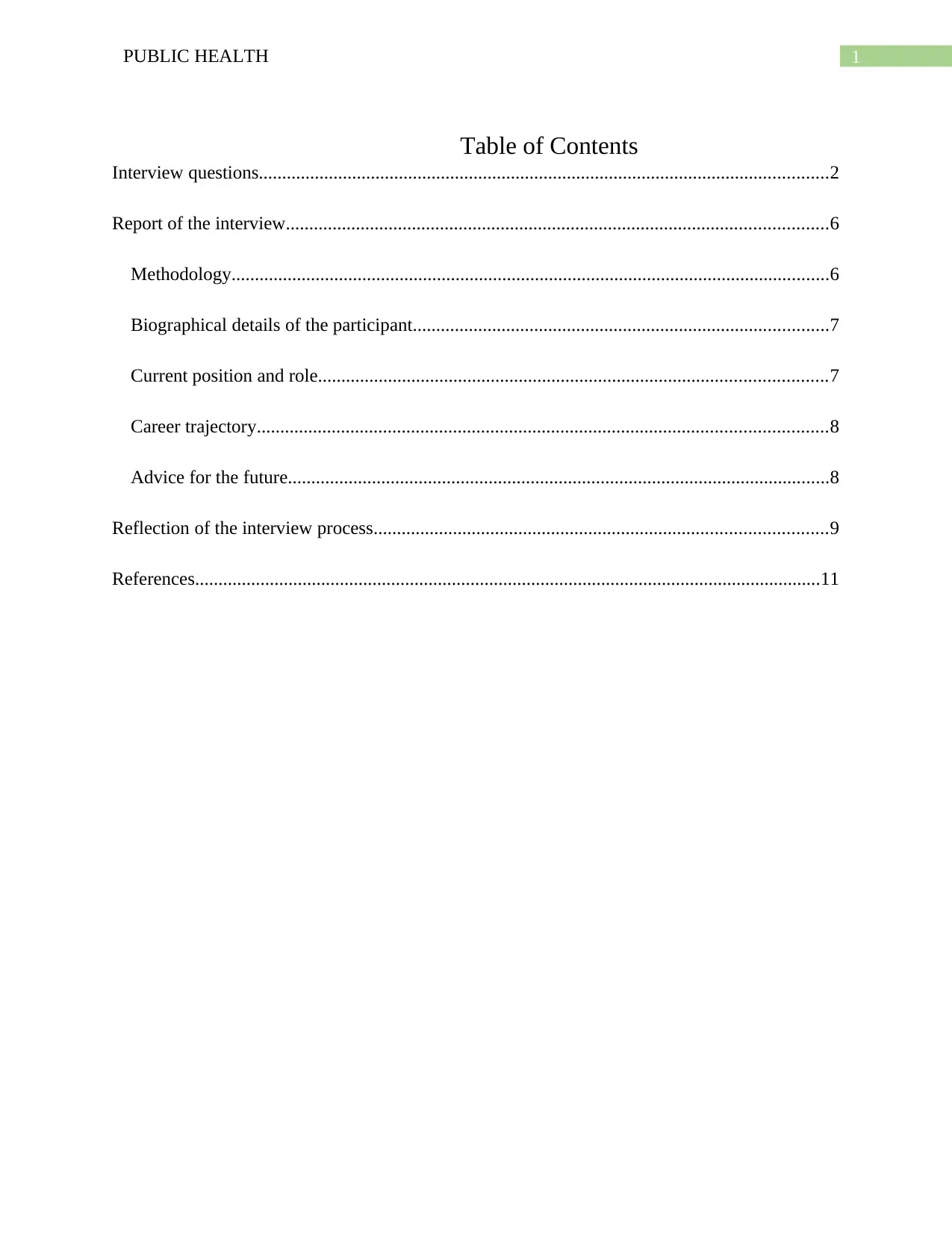
1PUBLIC HEALTH
Table of Contents
Interview questions..........................................................................................................................2
Report of the interview....................................................................................................................6
Methodology................................................................................................................................6
Biographical details of the participant.........................................................................................7
Current position and role.............................................................................................................7
Career trajectory..........................................................................................................................8
Advice for the future....................................................................................................................8
Reflection of the interview process.................................................................................................9
References......................................................................................................................................11
Table of Contents
Interview questions..........................................................................................................................2
Report of the interview....................................................................................................................6
Methodology................................................................................................................................6
Biographical details of the participant.........................................................................................7
Current position and role.............................................................................................................7
Career trajectory..........................................................................................................................8
Advice for the future....................................................................................................................8
Reflection of the interview process.................................................................................................9
References......................................................................................................................................11
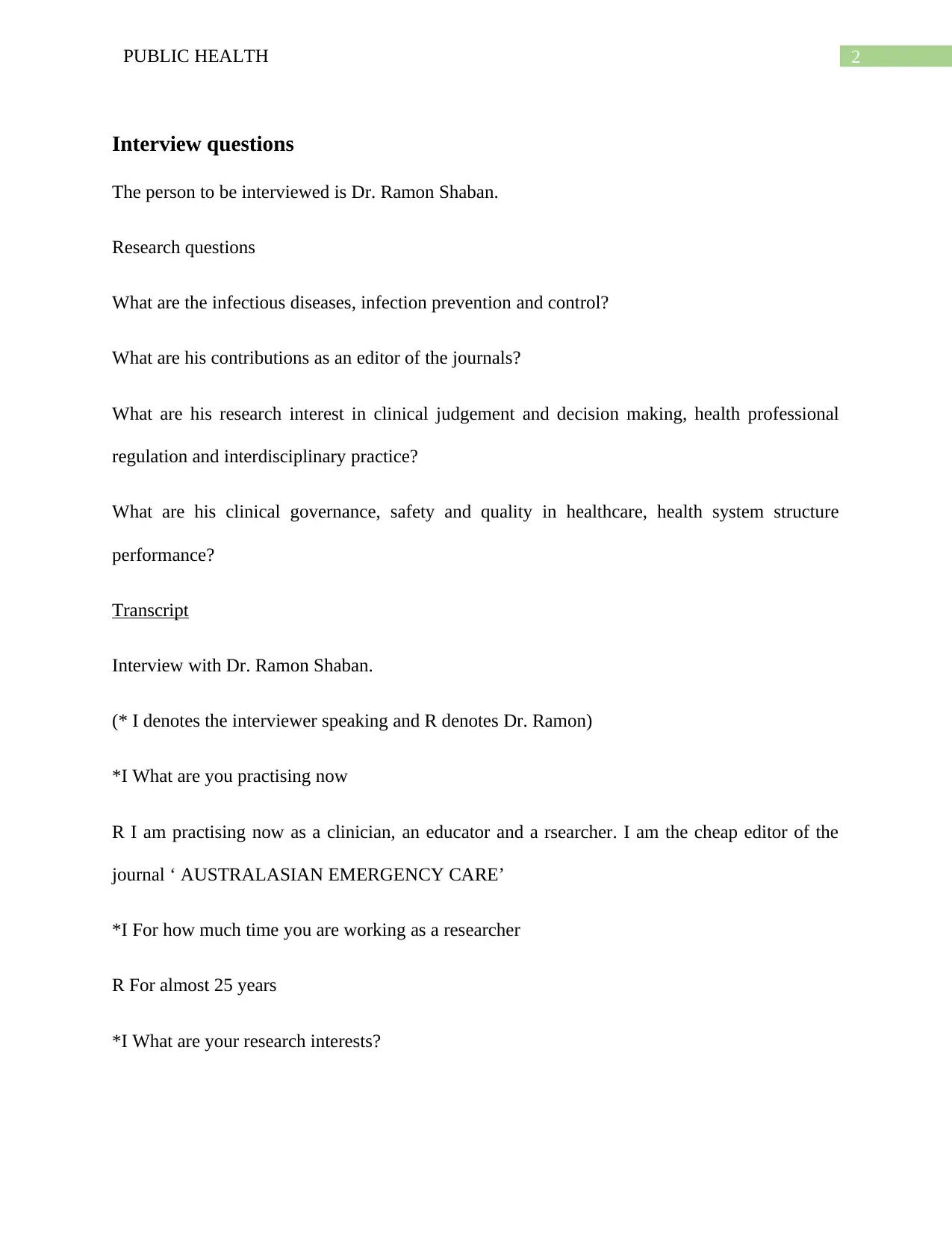
2PUBLIC HEALTH
Interview questions
The person to be interviewed is Dr. Ramon Shaban.
Research questions
What are the infectious diseases, infection prevention and control?
What are his contributions as an editor of the journals?
What are his research interest in clinical judgement and decision making, health professional
regulation and interdisciplinary practice?
What are his clinical governance, safety and quality in healthcare, health system structure
performance?
Transcript
Interview with Dr. Ramon Shaban.
(* I denotes the interviewer speaking and R denotes Dr. Ramon)
*I What are you practising now
R I am practising now as a clinician, an educator and a rsearcher. I am the cheap editor of the
journal ‘ AUSTRALASIAN EMERGENCY CARE’
*I For how much time you are working as a researcher
R For almost 25 years
*I What are your research interests?
Interview questions
The person to be interviewed is Dr. Ramon Shaban.
Research questions
What are the infectious diseases, infection prevention and control?
What are his contributions as an editor of the journals?
What are his research interest in clinical judgement and decision making, health professional
regulation and interdisciplinary practice?
What are his clinical governance, safety and quality in healthcare, health system structure
performance?
Transcript
Interview with Dr. Ramon Shaban.
(* I denotes the interviewer speaking and R denotes Dr. Ramon)
*I What are you practising now
R I am practising now as a clinician, an educator and a rsearcher. I am the cheap editor of the
journal ‘ AUSTRALASIAN EMERGENCY CARE’
*I For how much time you are working as a researcher
R For almost 25 years
*I What are your research interests?
⊘ This is a preview!⊘
Do you want full access?
Subscribe today to unlock all pages.

Trusted by 1+ million students worldwide
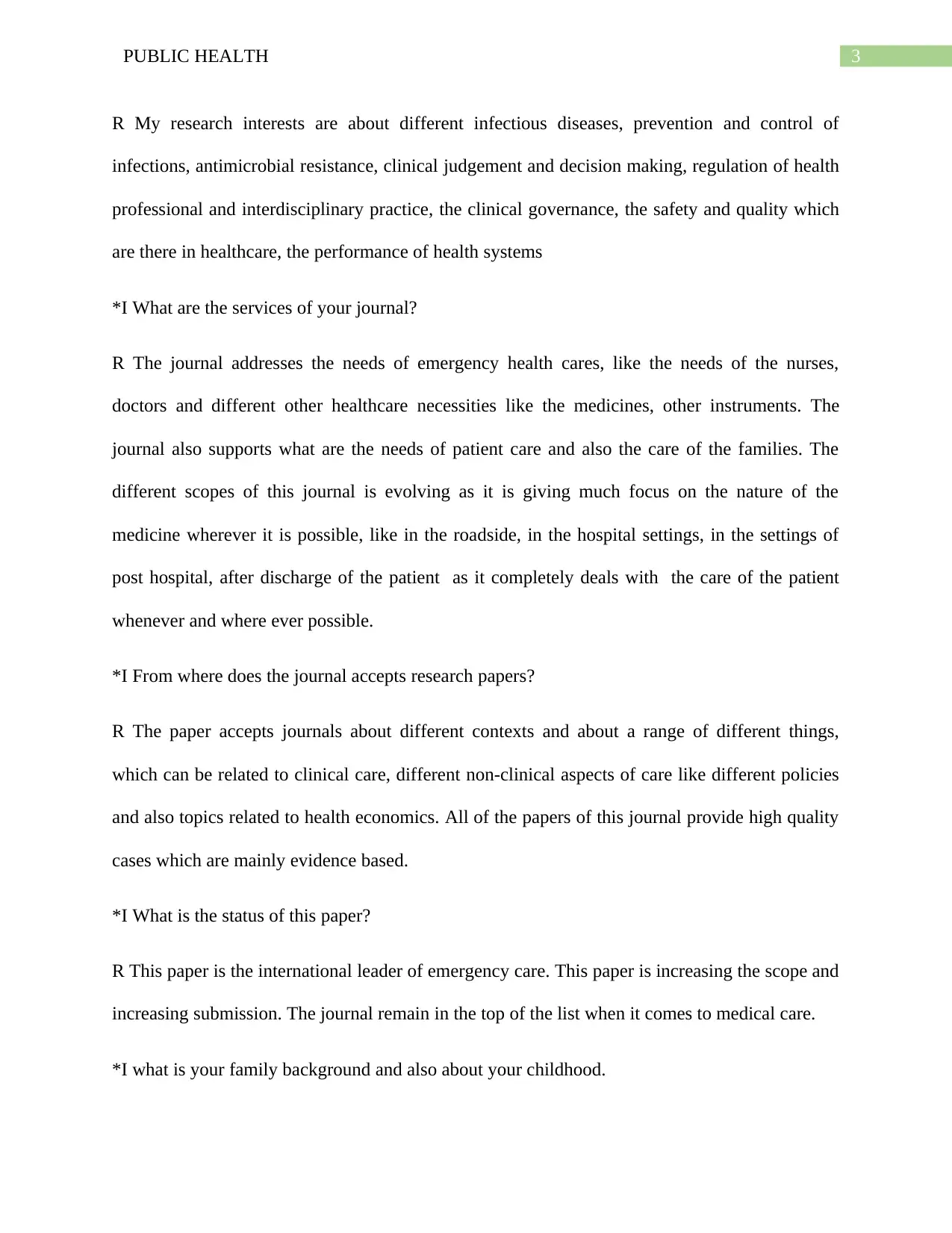
3PUBLIC HEALTH
R My research interests are about different infectious diseases, prevention and control of
infections, antimicrobial resistance, clinical judgement and decision making, regulation of health
professional and interdisciplinary practice, the clinical governance, the safety and quality which
are there in healthcare, the performance of health systems
*I What are the services of your journal?
R The journal addresses the needs of emergency health cares, like the needs of the nurses,
doctors and different other healthcare necessities like the medicines, other instruments. The
journal also supports what are the needs of patient care and also the care of the families. The
different scopes of this journal is evolving as it is giving much focus on the nature of the
medicine wherever it is possible, like in the roadside, in the hospital settings, in the settings of
post hospital, after discharge of the patient as it completely deals with the care of the patient
whenever and where ever possible.
*I From where does the journal accepts research papers?
R The paper accepts journals about different contexts and about a range of different things,
which can be related to clinical care, different non-clinical aspects of care like different policies
and also topics related to health economics. All of the papers of this journal provide high quality
cases which are mainly evidence based.
*I What is the status of this paper?
R This paper is the international leader of emergency care. This paper is increasing the scope and
increasing submission. The journal remain in the top of the list when it comes to medical care.
*I what is your family background and also about your childhood.
R My research interests are about different infectious diseases, prevention and control of
infections, antimicrobial resistance, clinical judgement and decision making, regulation of health
professional and interdisciplinary practice, the clinical governance, the safety and quality which
are there in healthcare, the performance of health systems
*I What are the services of your journal?
R The journal addresses the needs of emergency health cares, like the needs of the nurses,
doctors and different other healthcare necessities like the medicines, other instruments. The
journal also supports what are the needs of patient care and also the care of the families. The
different scopes of this journal is evolving as it is giving much focus on the nature of the
medicine wherever it is possible, like in the roadside, in the hospital settings, in the settings of
post hospital, after discharge of the patient as it completely deals with the care of the patient
whenever and where ever possible.
*I From where does the journal accepts research papers?
R The paper accepts journals about different contexts and about a range of different things,
which can be related to clinical care, different non-clinical aspects of care like different policies
and also topics related to health economics. All of the papers of this journal provide high quality
cases which are mainly evidence based.
*I What is the status of this paper?
R This paper is the international leader of emergency care. This paper is increasing the scope and
increasing submission. The journal remain in the top of the list when it comes to medical care.
*I what is your family background and also about your childhood.
Paraphrase This Document
Need a fresh take? Get an instant paraphrase of this document with our AI Paraphraser
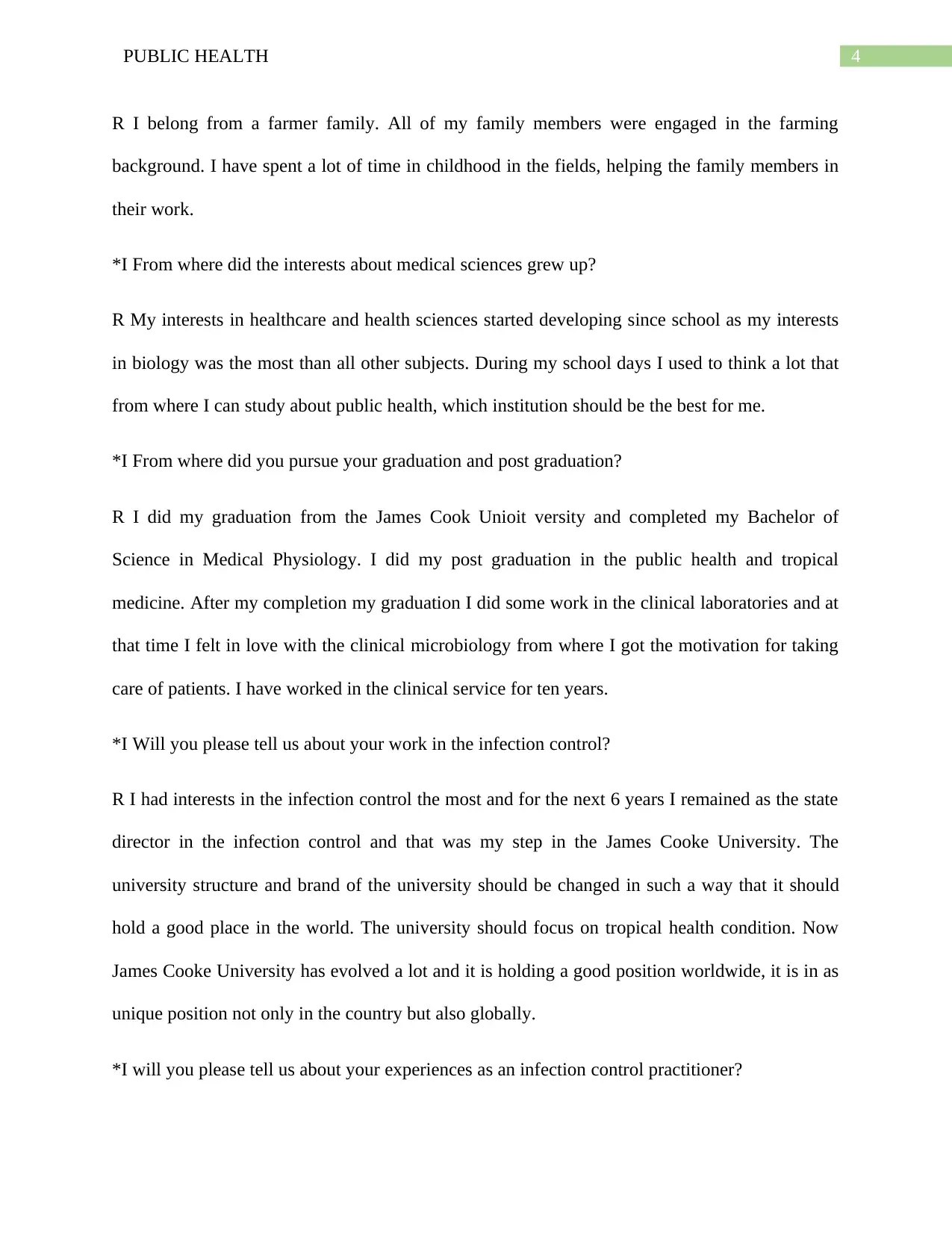
4PUBLIC HEALTH
R I belong from a farmer family. All of my family members were engaged in the farming
background. I have spent a lot of time in childhood in the fields, helping the family members in
their work.
*I From where did the interests about medical sciences grew up?
R My interests in healthcare and health sciences started developing since school as my interests
in biology was the most than all other subjects. During my school days I used to think a lot that
from where I can study about public health, which institution should be the best for me.
*I From where did you pursue your graduation and post graduation?
R I did my graduation from the James Cook Unioit versity and completed my Bachelor of
Science in Medical Physiology. I did my post graduation in the public health and tropical
medicine. After my completion my graduation I did some work in the clinical laboratories and at
that time I felt in love with the clinical microbiology from where I got the motivation for taking
care of patients. I have worked in the clinical service for ten years.
*I Will you please tell us about your work in the infection control?
R I had interests in the infection control the most and for the next 6 years I remained as the state
director in the infection control and that was my step in the James Cooke University. The
university structure and brand of the university should be changed in such a way that it should
hold a good place in the world. The university should focus on tropical health condition. Now
James Cooke University has evolved a lot and it is holding a good position worldwide, it is in as
unique position not only in the country but also globally.
*I will you please tell us about your experiences as an infection control practitioner?
R I belong from a farmer family. All of my family members were engaged in the farming
background. I have spent a lot of time in childhood in the fields, helping the family members in
their work.
*I From where did the interests about medical sciences grew up?
R My interests in healthcare and health sciences started developing since school as my interests
in biology was the most than all other subjects. During my school days I used to think a lot that
from where I can study about public health, which institution should be the best for me.
*I From where did you pursue your graduation and post graduation?
R I did my graduation from the James Cook Unioit versity and completed my Bachelor of
Science in Medical Physiology. I did my post graduation in the public health and tropical
medicine. After my completion my graduation I did some work in the clinical laboratories and at
that time I felt in love with the clinical microbiology from where I got the motivation for taking
care of patients. I have worked in the clinical service for ten years.
*I Will you please tell us about your work in the infection control?
R I had interests in the infection control the most and for the next 6 years I remained as the state
director in the infection control and that was my step in the James Cooke University. The
university structure and brand of the university should be changed in such a way that it should
hold a good place in the world. The university should focus on tropical health condition. Now
James Cooke University has evolved a lot and it is holding a good position worldwide, it is in as
unique position not only in the country but also globally.
*I will you please tell us about your experiences as an infection control practitioner?
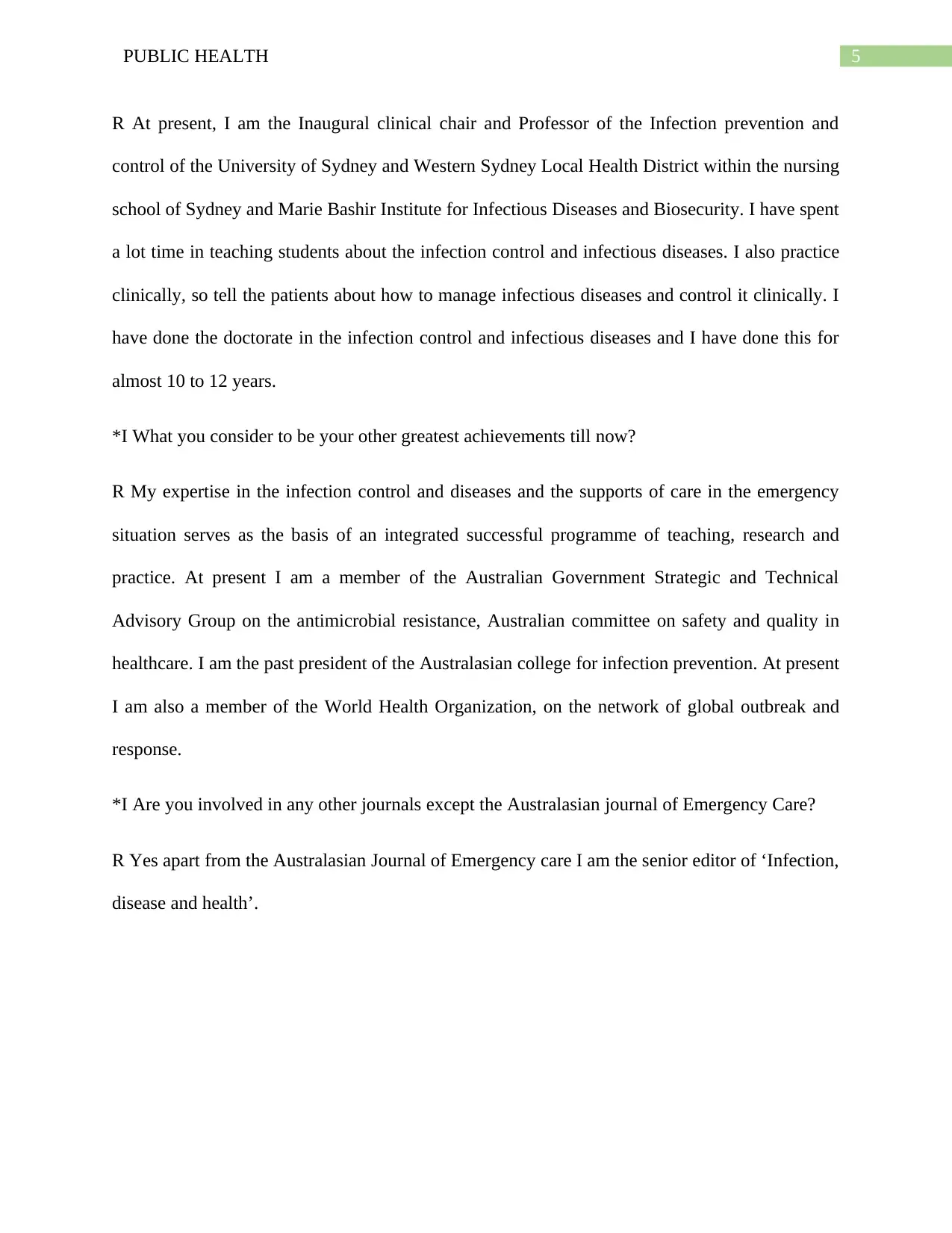
5PUBLIC HEALTH
R At present, I am the Inaugural clinical chair and Professor of the Infection prevention and
control of the University of Sydney and Western Sydney Local Health District within the nursing
school of Sydney and Marie Bashir Institute for Infectious Diseases and Biosecurity. I have spent
a lot time in teaching students about the infection control and infectious diseases. I also practice
clinically, so tell the patients about how to manage infectious diseases and control it clinically. I
have done the doctorate in the infection control and infectious diseases and I have done this for
almost 10 to 12 years.
*I What you consider to be your other greatest achievements till now?
R My expertise in the infection control and diseases and the supports of care in the emergency
situation serves as the basis of an integrated successful programme of teaching, research and
practice. At present I am a member of the Australian Government Strategic and Technical
Advisory Group on the antimicrobial resistance, Australian committee on safety and quality in
healthcare. I am the past president of the Australasian college for infection prevention. At present
I am also a member of the World Health Organization, on the network of global outbreak and
response.
*I Are you involved in any other journals except the Australasian journal of Emergency Care?
R Yes apart from the Australasian Journal of Emergency care I am the senior editor of ‘Infection,
disease and health’.
R At present, I am the Inaugural clinical chair and Professor of the Infection prevention and
control of the University of Sydney and Western Sydney Local Health District within the nursing
school of Sydney and Marie Bashir Institute for Infectious Diseases and Biosecurity. I have spent
a lot time in teaching students about the infection control and infectious diseases. I also practice
clinically, so tell the patients about how to manage infectious diseases and control it clinically. I
have done the doctorate in the infection control and infectious diseases and I have done this for
almost 10 to 12 years.
*I What you consider to be your other greatest achievements till now?
R My expertise in the infection control and diseases and the supports of care in the emergency
situation serves as the basis of an integrated successful programme of teaching, research and
practice. At present I am a member of the Australian Government Strategic and Technical
Advisory Group on the antimicrobial resistance, Australian committee on safety and quality in
healthcare. I am the past president of the Australasian college for infection prevention. At present
I am also a member of the World Health Organization, on the network of global outbreak and
response.
*I Are you involved in any other journals except the Australasian journal of Emergency Care?
R Yes apart from the Australasian Journal of Emergency care I am the senior editor of ‘Infection,
disease and health’.
⊘ This is a preview!⊘
Do you want full access?
Subscribe today to unlock all pages.

Trusted by 1+ million students worldwide
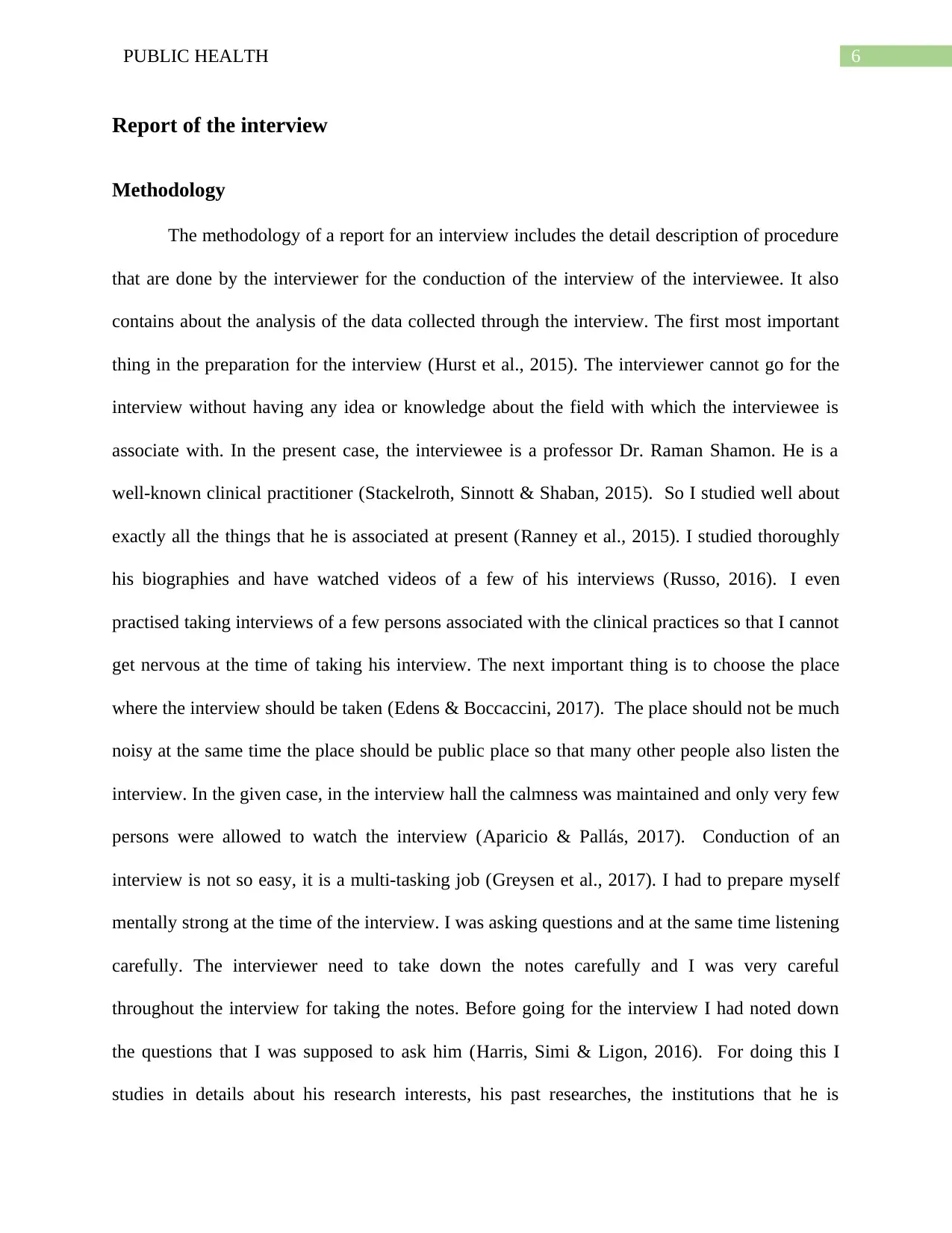
6PUBLIC HEALTH
Report of the interview
Methodology
The methodology of a report for an interview includes the detail description of procedure
that are done by the interviewer for the conduction of the interview of the interviewee. It also
contains about the analysis of the data collected through the interview. The first most important
thing in the preparation for the interview (Hurst et al., 2015). The interviewer cannot go for the
interview without having any idea or knowledge about the field with which the interviewee is
associate with. In the present case, the interviewee is a professor Dr. Raman Shamon. He is a
well-known clinical practitioner (Stackelroth, Sinnott & Shaban, 2015). So I studied well about
exactly all the things that he is associated at present (Ranney et al., 2015). I studied thoroughly
his biographies and have watched videos of a few of his interviews (Russo, 2016). I even
practised taking interviews of a few persons associated with the clinical practices so that I cannot
get nervous at the time of taking his interview. The next important thing is to choose the place
where the interview should be taken (Edens & Boccaccini, 2017). The place should not be much
noisy at the same time the place should be public place so that many other people also listen the
interview. In the given case, in the interview hall the calmness was maintained and only very few
persons were allowed to watch the interview (Aparicio & Pallás, 2017). Conduction of an
interview is not so easy, it is a multi-tasking job (Greysen et al., 2017). I had to prepare myself
mentally strong at the time of the interview. I was asking questions and at the same time listening
carefully. The interviewer need to take down the notes carefully and I was very careful
throughout the interview for taking the notes. Before going for the interview I had noted down
the questions that I was supposed to ask him (Harris, Simi & Ligon, 2016). For doing this I
studies in details about his research interests, his past researches, the institutions that he is
Report of the interview
Methodology
The methodology of a report for an interview includes the detail description of procedure
that are done by the interviewer for the conduction of the interview of the interviewee. It also
contains about the analysis of the data collected through the interview. The first most important
thing in the preparation for the interview (Hurst et al., 2015). The interviewer cannot go for the
interview without having any idea or knowledge about the field with which the interviewee is
associate with. In the present case, the interviewee is a professor Dr. Raman Shamon. He is a
well-known clinical practitioner (Stackelroth, Sinnott & Shaban, 2015). So I studied well about
exactly all the things that he is associated at present (Ranney et al., 2015). I studied thoroughly
his biographies and have watched videos of a few of his interviews (Russo, 2016). I even
practised taking interviews of a few persons associated with the clinical practices so that I cannot
get nervous at the time of taking his interview. The next important thing is to choose the place
where the interview should be taken (Edens & Boccaccini, 2017). The place should not be much
noisy at the same time the place should be public place so that many other people also listen the
interview. In the given case, in the interview hall the calmness was maintained and only very few
persons were allowed to watch the interview (Aparicio & Pallás, 2017). Conduction of an
interview is not so easy, it is a multi-tasking job (Greysen et al., 2017). I had to prepare myself
mentally strong at the time of the interview. I was asking questions and at the same time listening
carefully. The interviewer need to take down the notes carefully and I was very careful
throughout the interview for taking the notes. Before going for the interview I had noted down
the questions that I was supposed to ask him (Harris, Simi & Ligon, 2016). For doing this I
studies in details about his research interests, his past researches, the institutions that he is
Paraphrase This Document
Need a fresh take? Get an instant paraphrase of this document with our AI Paraphraser
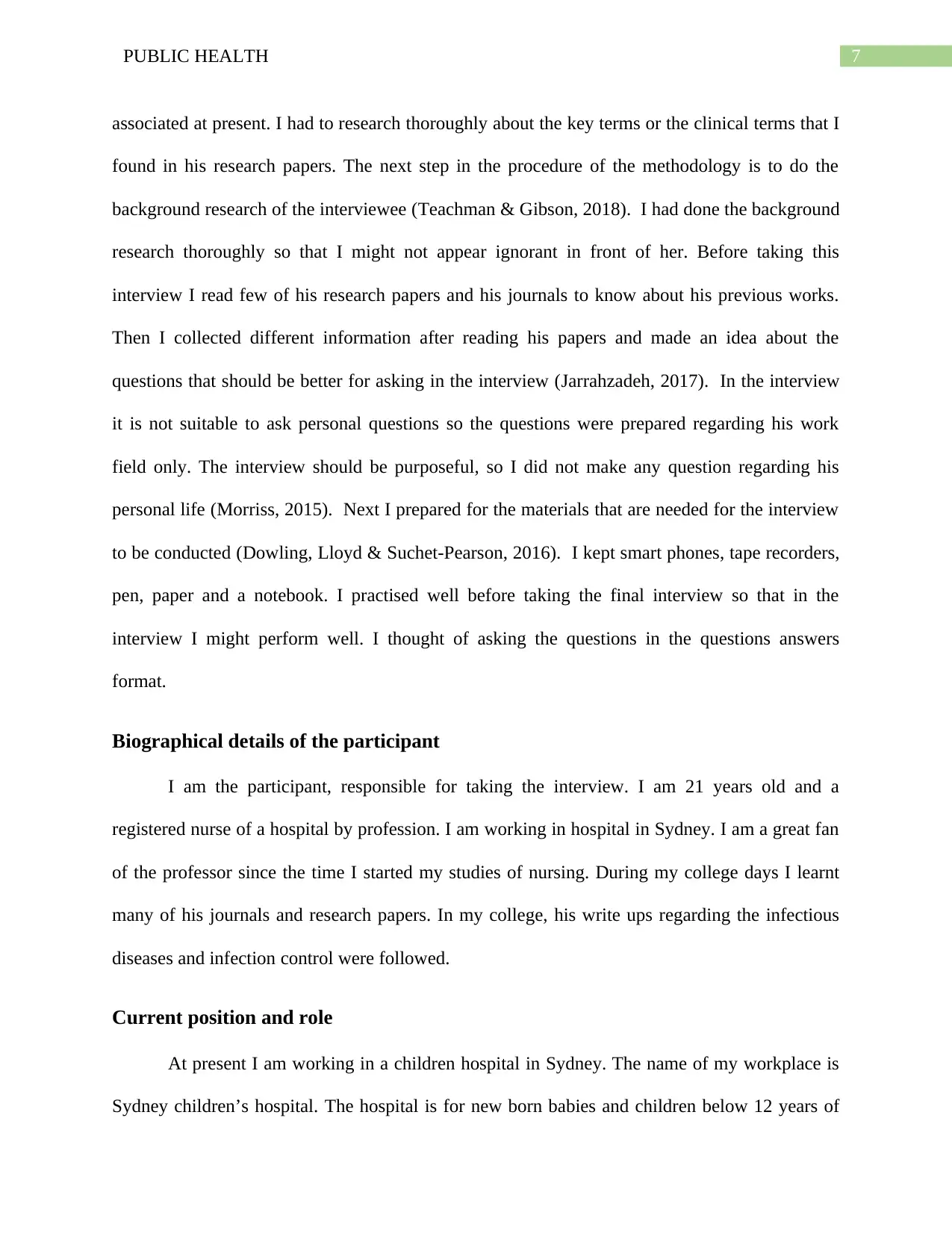
7PUBLIC HEALTH
associated at present. I had to research thoroughly about the key terms or the clinical terms that I
found in his research papers. The next step in the procedure of the methodology is to do the
background research of the interviewee (Teachman & Gibson, 2018). I had done the background
research thoroughly so that I might not appear ignorant in front of her. Before taking this
interview I read few of his research papers and his journals to know about his previous works.
Then I collected different information after reading his papers and made an idea about the
questions that should be better for asking in the interview (Jarrahzadeh, 2017). In the interview
it is not suitable to ask personal questions so the questions were prepared regarding his work
field only. The interview should be purposeful, so I did not make any question regarding his
personal life (Morriss, 2015). Next I prepared for the materials that are needed for the interview
to be conducted (Dowling, Lloyd & Suchet-Pearson, 2016). I kept smart phones, tape recorders,
pen, paper and a notebook. I practised well before taking the final interview so that in the
interview I might perform well. I thought of asking the questions in the questions answers
format.
Biographical details of the participant
I am the participant, responsible for taking the interview. I am 21 years old and a
registered nurse of a hospital by profession. I am working in hospital in Sydney. I am a great fan
of the professor since the time I started my studies of nursing. During my college days I learnt
many of his journals and research papers. In my college, his write ups regarding the infectious
diseases and infection control were followed.
Current position and role
At present I am working in a children hospital in Sydney. The name of my workplace is
Sydney children’s hospital. The hospital is for new born babies and children below 12 years of
associated at present. I had to research thoroughly about the key terms or the clinical terms that I
found in his research papers. The next step in the procedure of the methodology is to do the
background research of the interviewee (Teachman & Gibson, 2018). I had done the background
research thoroughly so that I might not appear ignorant in front of her. Before taking this
interview I read few of his research papers and his journals to know about his previous works.
Then I collected different information after reading his papers and made an idea about the
questions that should be better for asking in the interview (Jarrahzadeh, 2017). In the interview
it is not suitable to ask personal questions so the questions were prepared regarding his work
field only. The interview should be purposeful, so I did not make any question regarding his
personal life (Morriss, 2015). Next I prepared for the materials that are needed for the interview
to be conducted (Dowling, Lloyd & Suchet-Pearson, 2016). I kept smart phones, tape recorders,
pen, paper and a notebook. I practised well before taking the final interview so that in the
interview I might perform well. I thought of asking the questions in the questions answers
format.
Biographical details of the participant
I am the participant, responsible for taking the interview. I am 21 years old and a
registered nurse of a hospital by profession. I am working in hospital in Sydney. I am a great fan
of the professor since the time I started my studies of nursing. During my college days I learnt
many of his journals and research papers. In my college, his write ups regarding the infectious
diseases and infection control were followed.
Current position and role
At present I am working in a children hospital in Sydney. The name of my workplace is
Sydney children’s hospital. The hospital is for new born babies and children below 12 years of
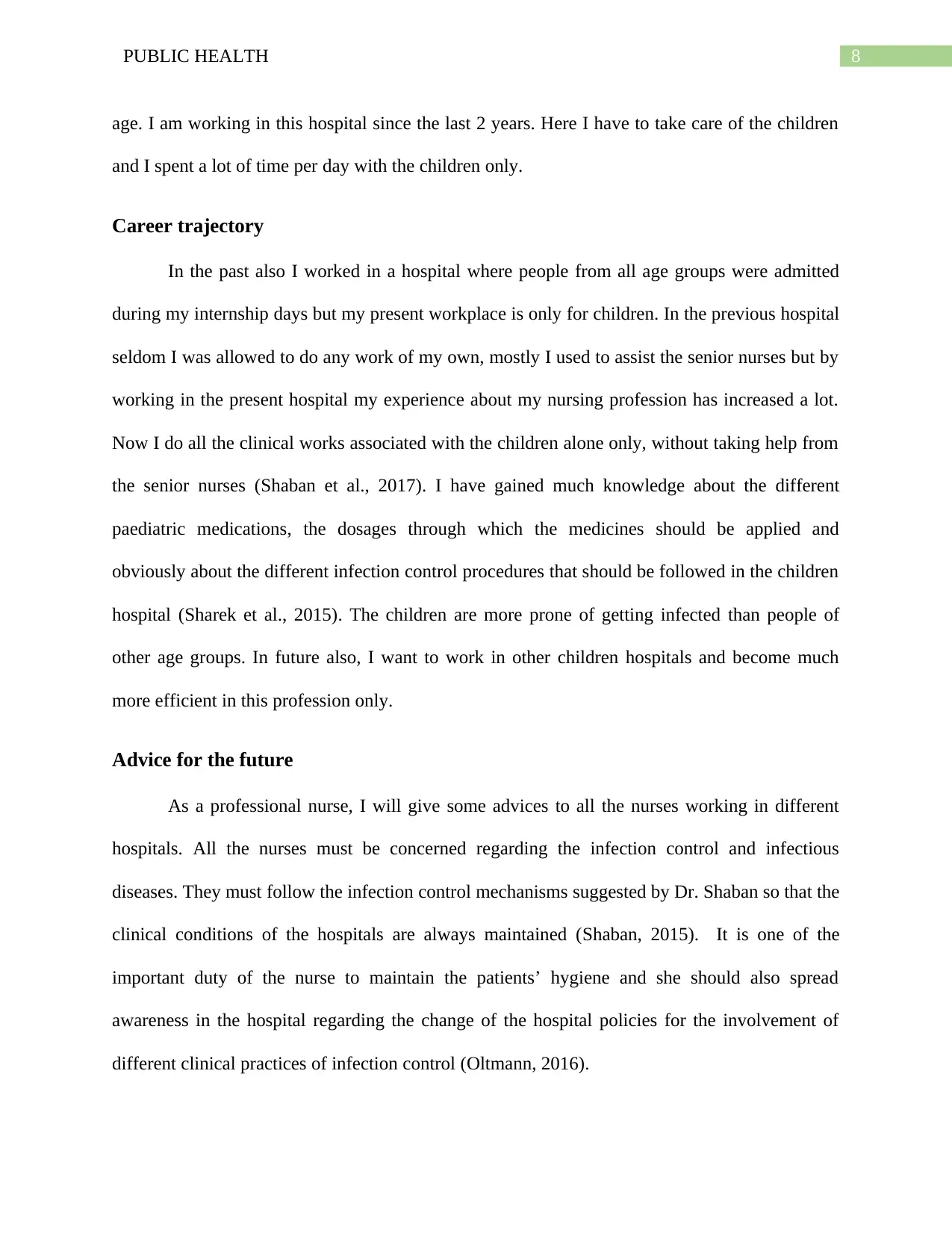
8PUBLIC HEALTH
age. I am working in this hospital since the last 2 years. Here I have to take care of the children
and I spent a lot of time per day with the children only.
Career trajectory
In the past also I worked in a hospital where people from all age groups were admitted
during my internship days but my present workplace is only for children. In the previous hospital
seldom I was allowed to do any work of my own, mostly I used to assist the senior nurses but by
working in the present hospital my experience about my nursing profession has increased a lot.
Now I do all the clinical works associated with the children alone only, without taking help from
the senior nurses (Shaban et al., 2017). I have gained much knowledge about the different
paediatric medications, the dosages through which the medicines should be applied and
obviously about the different infection control procedures that should be followed in the children
hospital (Sharek et al., 2015). The children are more prone of getting infected than people of
other age groups. In future also, I want to work in other children hospitals and become much
more efficient in this profession only.
Advice for the future
As a professional nurse, I will give some advices to all the nurses working in different
hospitals. All the nurses must be concerned regarding the infection control and infectious
diseases. They must follow the infection control mechanisms suggested by Dr. Shaban so that the
clinical conditions of the hospitals are always maintained (Shaban, 2015). It is one of the
important duty of the nurse to maintain the patients’ hygiene and she should also spread
awareness in the hospital regarding the change of the hospital policies for the involvement of
different clinical practices of infection control (Oltmann, 2016).
age. I am working in this hospital since the last 2 years. Here I have to take care of the children
and I spent a lot of time per day with the children only.
Career trajectory
In the past also I worked in a hospital where people from all age groups were admitted
during my internship days but my present workplace is only for children. In the previous hospital
seldom I was allowed to do any work of my own, mostly I used to assist the senior nurses but by
working in the present hospital my experience about my nursing profession has increased a lot.
Now I do all the clinical works associated with the children alone only, without taking help from
the senior nurses (Shaban et al., 2017). I have gained much knowledge about the different
paediatric medications, the dosages through which the medicines should be applied and
obviously about the different infection control procedures that should be followed in the children
hospital (Sharek et al., 2015). The children are more prone of getting infected than people of
other age groups. In future also, I want to work in other children hospitals and become much
more efficient in this profession only.
Advice for the future
As a professional nurse, I will give some advices to all the nurses working in different
hospitals. All the nurses must be concerned regarding the infection control and infectious
diseases. They must follow the infection control mechanisms suggested by Dr. Shaban so that the
clinical conditions of the hospitals are always maintained (Shaban, 2015). It is one of the
important duty of the nurse to maintain the patients’ hygiene and she should also spread
awareness in the hospital regarding the change of the hospital policies for the involvement of
different clinical practices of infection control (Oltmann, 2016).
⊘ This is a preview!⊘
Do you want full access?
Subscribe today to unlock all pages.

Trusted by 1+ million students worldwide
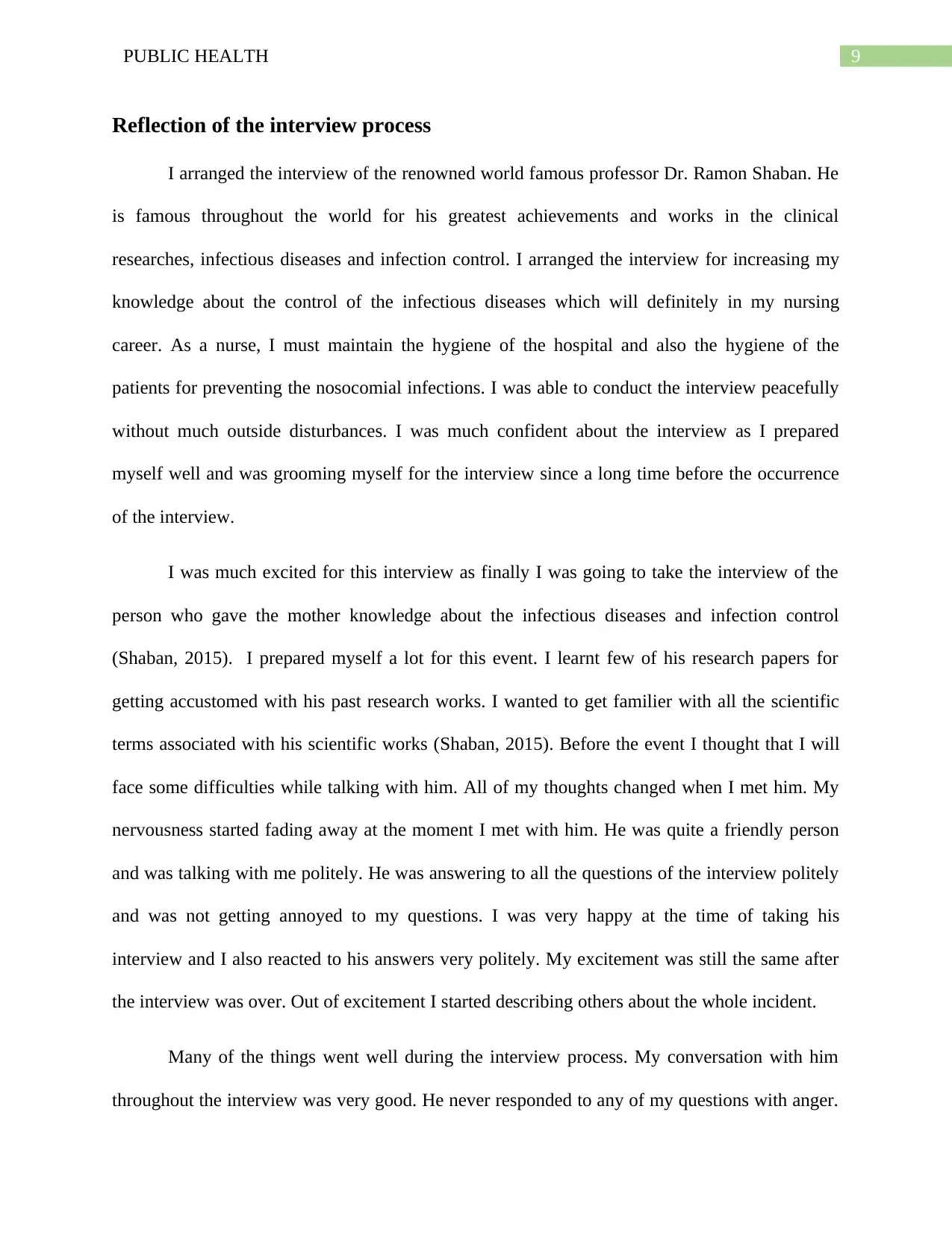
9PUBLIC HEALTH
Reflection of the interview process
I arranged the interview of the renowned world famous professor Dr. Ramon Shaban. He
is famous throughout the world for his greatest achievements and works in the clinical
researches, infectious diseases and infection control. I arranged the interview for increasing my
knowledge about the control of the infectious diseases which will definitely in my nursing
career. As a nurse, I must maintain the hygiene of the hospital and also the hygiene of the
patients for preventing the nosocomial infections. I was able to conduct the interview peacefully
without much outside disturbances. I was much confident about the interview as I prepared
myself well and was grooming myself for the interview since a long time before the occurrence
of the interview.
I was much excited for this interview as finally I was going to take the interview of the
person who gave the mother knowledge about the infectious diseases and infection control
(Shaban, 2015). I prepared myself a lot for this event. I learnt few of his research papers for
getting accustomed with his past research works. I wanted to get familier with all the scientific
terms associated with his scientific works (Shaban, 2015). Before the event I thought that I will
face some difficulties while talking with him. All of my thoughts changed when I met him. My
nervousness started fading away at the moment I met with him. He was quite a friendly person
and was talking with me politely. He was answering to all the questions of the interview politely
and was not getting annoyed to my questions. I was very happy at the time of taking his
interview and I also reacted to his answers very politely. My excitement was still the same after
the interview was over. Out of excitement I started describing others about the whole incident.
Many of the things went well during the interview process. My conversation with him
throughout the interview was very good. He never responded to any of my questions with anger.
Reflection of the interview process
I arranged the interview of the renowned world famous professor Dr. Ramon Shaban. He
is famous throughout the world for his greatest achievements and works in the clinical
researches, infectious diseases and infection control. I arranged the interview for increasing my
knowledge about the control of the infectious diseases which will definitely in my nursing
career. As a nurse, I must maintain the hygiene of the hospital and also the hygiene of the
patients for preventing the nosocomial infections. I was able to conduct the interview peacefully
without much outside disturbances. I was much confident about the interview as I prepared
myself well and was grooming myself for the interview since a long time before the occurrence
of the interview.
I was much excited for this interview as finally I was going to take the interview of the
person who gave the mother knowledge about the infectious diseases and infection control
(Shaban, 2015). I prepared myself a lot for this event. I learnt few of his research papers for
getting accustomed with his past research works. I wanted to get familier with all the scientific
terms associated with his scientific works (Shaban, 2015). Before the event I thought that I will
face some difficulties while talking with him. All of my thoughts changed when I met him. My
nervousness started fading away at the moment I met with him. He was quite a friendly person
and was talking with me politely. He was answering to all the questions of the interview politely
and was not getting annoyed to my questions. I was very happy at the time of taking his
interview and I also reacted to his answers very politely. My excitement was still the same after
the interview was over. Out of excitement I started describing others about the whole incident.
Many of the things went well during the interview process. My conversation with him
throughout the interview was very good. He never responded to any of my questions with anger.
Paraphrase This Document
Need a fresh take? Get an instant paraphrase of this document with our AI Paraphraser
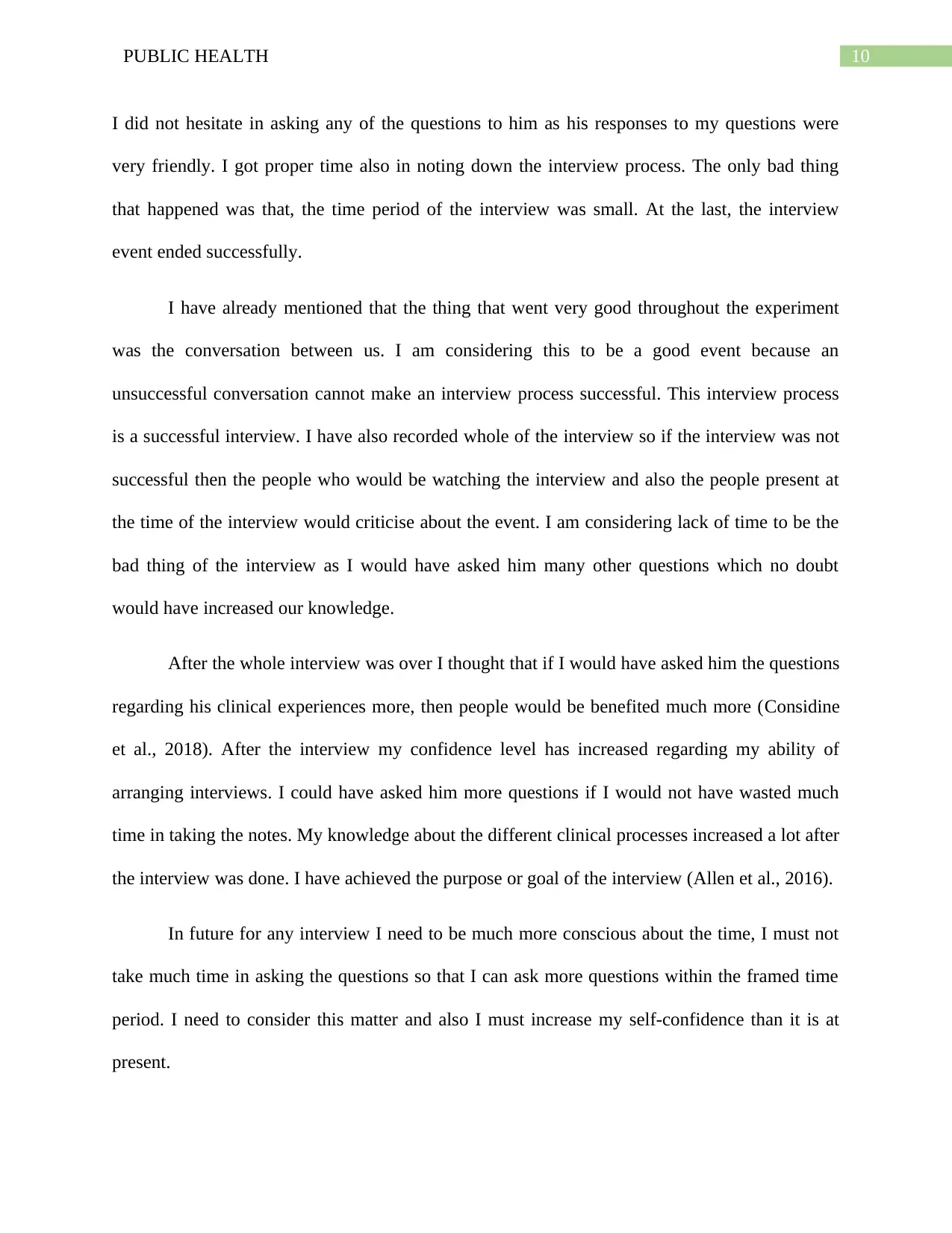
10PUBLIC HEALTH
I did not hesitate in asking any of the questions to him as his responses to my questions were
very friendly. I got proper time also in noting down the interview process. The only bad thing
that happened was that, the time period of the interview was small. At the last, the interview
event ended successfully.
I have already mentioned that the thing that went very good throughout the experiment
was the conversation between us. I am considering this to be a good event because an
unsuccessful conversation cannot make an interview process successful. This interview process
is a successful interview. I have also recorded whole of the interview so if the interview was not
successful then the people who would be watching the interview and also the people present at
the time of the interview would criticise about the event. I am considering lack of time to be the
bad thing of the interview as I would have asked him many other questions which no doubt
would have increased our knowledge.
After the whole interview was over I thought that if I would have asked him the questions
regarding his clinical experiences more, then people would be benefited much more (Considine
et al., 2018). After the interview my confidence level has increased regarding my ability of
arranging interviews. I could have asked him more questions if I would not have wasted much
time in taking the notes. My knowledge about the different clinical processes increased a lot after
the interview was done. I have achieved the purpose or goal of the interview (Allen et al., 2016).
In future for any interview I need to be much more conscious about the time, I must not
take much time in asking the questions so that I can ask more questions within the framed time
period. I need to consider this matter and also I must increase my self-confidence than it is at
present.
I did not hesitate in asking any of the questions to him as his responses to my questions were
very friendly. I got proper time also in noting down the interview process. The only bad thing
that happened was that, the time period of the interview was small. At the last, the interview
event ended successfully.
I have already mentioned that the thing that went very good throughout the experiment
was the conversation between us. I am considering this to be a good event because an
unsuccessful conversation cannot make an interview process successful. This interview process
is a successful interview. I have also recorded whole of the interview so if the interview was not
successful then the people who would be watching the interview and also the people present at
the time of the interview would criticise about the event. I am considering lack of time to be the
bad thing of the interview as I would have asked him many other questions which no doubt
would have increased our knowledge.
After the whole interview was over I thought that if I would have asked him the questions
regarding his clinical experiences more, then people would be benefited much more (Considine
et al., 2018). After the interview my confidence level has increased regarding my ability of
arranging interviews. I could have asked him more questions if I would not have wasted much
time in taking the notes. My knowledge about the different clinical processes increased a lot after
the interview was done. I have achieved the purpose or goal of the interview (Allen et al., 2016).
In future for any interview I need to be much more conscious about the time, I must not
take much time in asking the questions so that I can ask more questions within the framed time
period. I need to consider this matter and also I must increase my self-confidence than it is at
present.
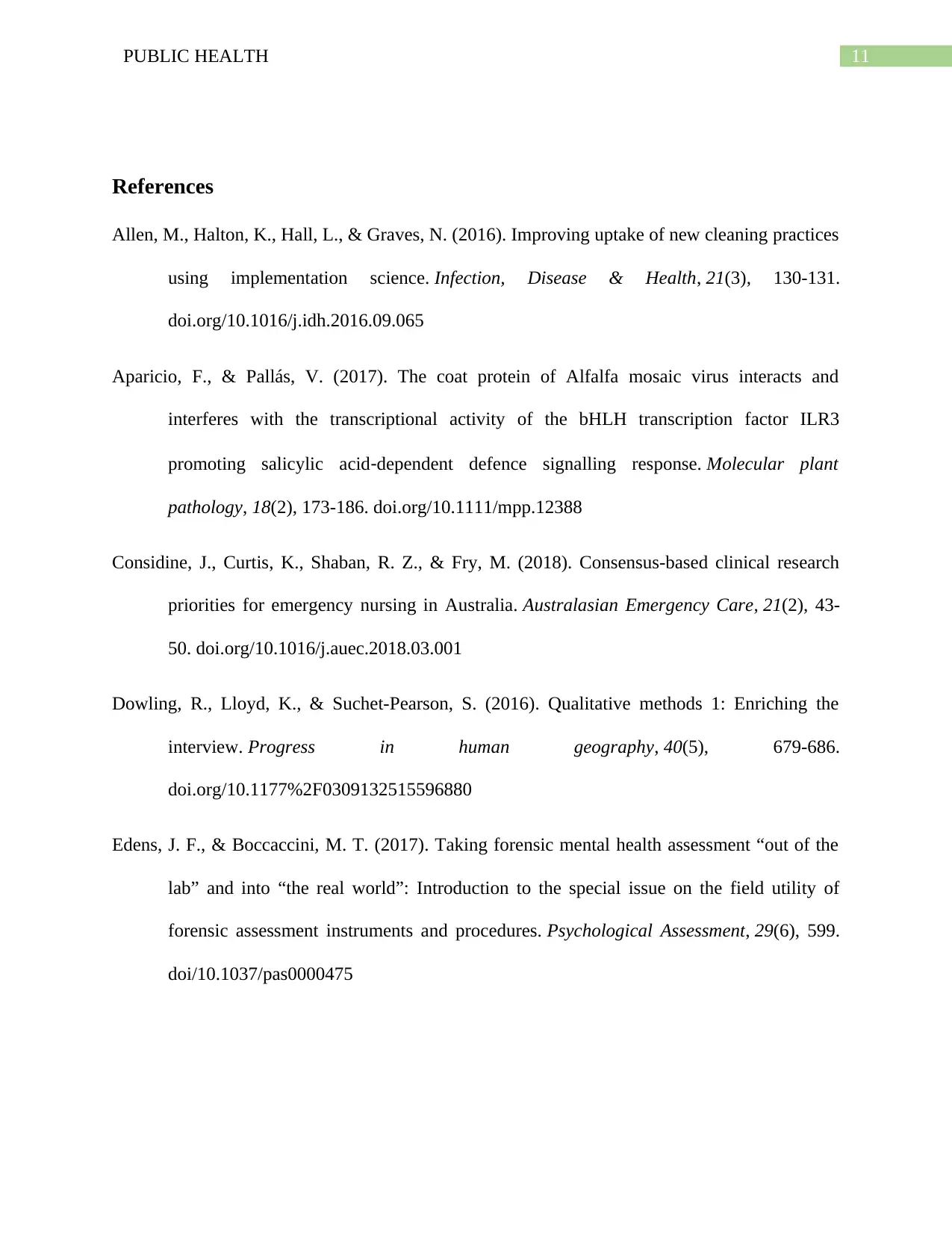
11PUBLIC HEALTH
References
Allen, M., Halton, K., Hall, L., & Graves, N. (2016). Improving uptake of new cleaning practices
using implementation science. Infection, Disease & Health, 21(3), 130-131.
doi.org/10.1016/j.idh.2016.09.065
Aparicio, F., & Pallás, V. (2017). The coat protein of Alfalfa mosaic virus interacts and
interferes with the transcriptional activity of the bHLH transcription factor ILR3
promoting salicylic acid‐dependent defence signalling response. Molecular plant
pathology, 18(2), 173-186. doi.org/10.1111/mpp.12388
Considine, J., Curtis, K., Shaban, R. Z., & Fry, M. (2018). Consensus-based clinical research
priorities for emergency nursing in Australia. Australasian Emergency Care, 21(2), 43-
50. doi.org/10.1016/j.auec.2018.03.001
Dowling, R., Lloyd, K., & Suchet-Pearson, S. (2016). Qualitative methods 1: Enriching the
interview. Progress in human geography, 40(5), 679-686.
doi.org/10.1177%2F0309132515596880
Edens, J. F., & Boccaccini, M. T. (2017). Taking forensic mental health assessment “out of the
lab” and into “the real world”: Introduction to the special issue on the field utility of
forensic assessment instruments and procedures. Psychological Assessment, 29(6), 599.
doi/10.1037/pas0000475
References
Allen, M., Halton, K., Hall, L., & Graves, N. (2016). Improving uptake of new cleaning practices
using implementation science. Infection, Disease & Health, 21(3), 130-131.
doi.org/10.1016/j.idh.2016.09.065
Aparicio, F., & Pallás, V. (2017). The coat protein of Alfalfa mosaic virus interacts and
interferes with the transcriptional activity of the bHLH transcription factor ILR3
promoting salicylic acid‐dependent defence signalling response. Molecular plant
pathology, 18(2), 173-186. doi.org/10.1111/mpp.12388
Considine, J., Curtis, K., Shaban, R. Z., & Fry, M. (2018). Consensus-based clinical research
priorities for emergency nursing in Australia. Australasian Emergency Care, 21(2), 43-
50. doi.org/10.1016/j.auec.2018.03.001
Dowling, R., Lloyd, K., & Suchet-Pearson, S. (2016). Qualitative methods 1: Enriching the
interview. Progress in human geography, 40(5), 679-686.
doi.org/10.1177%2F0309132515596880
Edens, J. F., & Boccaccini, M. T. (2017). Taking forensic mental health assessment “out of the
lab” and into “the real world”: Introduction to the special issue on the field utility of
forensic assessment instruments and procedures. Psychological Assessment, 29(6), 599.
doi/10.1037/pas0000475
⊘ This is a preview!⊘
Do you want full access?
Subscribe today to unlock all pages.

Trusted by 1+ million students worldwide
1 out of 15
Your All-in-One AI-Powered Toolkit for Academic Success.
+13062052269
info@desklib.com
Available 24*7 on WhatsApp / Email
![[object Object]](/_next/static/media/star-bottom.7253800d.svg)
Unlock your academic potential
Copyright © 2020–2026 A2Z Services. All Rights Reserved. Developed and managed by ZUCOL.

